Ap psychology personality Study guides, Class notes & Summaries
Looking for the best study guides, study notes and summaries about Ap psychology personality? On this page you'll find 100 study documents about Ap psychology personality.
Page 4 out of 100 results
Sort by
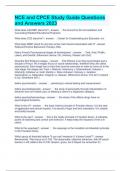
-
NCE and CPCE Study Guide Questions and Answers 2023
- Exam (elaborations) • 19 pages • 2023
- Available in package deal
-
- $20.49
- + learn more
NCE and CPCE Study Guide Questions and Answers 2023 What does CACREP stand for? the Council for the Accreditation and Counseling Related Educational Programs What does CCE stand for? Center for Credentialing and Education, inc What does REBT stand for and who is the main theorist associated with it? Rational Emotive Behavioral Therapy; Ellis. Name Freud's Psychosexual stages of development. Oral, Anal, Phallic, Latent, and Genital. (Mnemonic device: Oh, Anthony, Please...
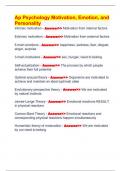
-
Ap Psychology Motivation, Emotion, and Personality
- Exam (elaborations) • 6 pages • 2024
- Available in package deal
-
- $12.49
- + learn more
Ap Psychology Motivation, Emotion, and Personality
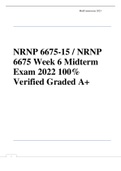
-
NRNP 6675-15; NRNP 6675 Week 6 Midterm Exam 2022 100% solved -Graded A+
- Exam (elaborations) • 32 pages • 2023
-
- $15.99
- + learn more
NRNP 6675-15; NRNP 6675 Week 6 Midterm Exam 2022 100% solved -Graded A+ NRNP 6675-15; NRNP 6675 Week 6 Midterm Exam 2022 100% solved -Graded A+ 1. Which of the following are risk factors for neuroleptic malignant syndrome? Select all that apply Age Rapid dose escalation Parental route of administration Higher potency typical antipsychotics 2. Antipsychotic medications provide D2 blockade in the mesocortical pathway causing which of the following effects? Reduces negative symptoms Increases e...
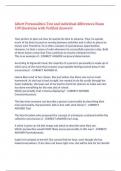
-
Albert Personalities Test and individual differences Exam 109 Questions with Verified Answers,100% CORRECT
- Exam (elaborations) • 17 pages • 2024
-
- $11.49
- + learn more
Albert Personalities Test and individual differences Exam 109 Questions with Verified Answers Titus prefers to plan out how he spends his time in advance. Thus, he spends much of his time focused on moving between activities and is often in places he knows well. Therefore, he is often unaware of spontaneous opportunities. However, he feels a sense of calm whenever he successfully executes a day. Both of these factors mean that Titus continues to closely schedule his time. This is an exampl...

-
AMSCO Questions AP Psychology exam 2023 with 100% correct answers
- Exam (elaborations) • 21 pages • 2023
-
- $13.49
- + learn more
Which of the following thinkers believed that people were born as blank slates and experiences formed their personality? Locke Samantha believes all behavior originates from unconscious forces developed primarily in childhood and focused primarily on sex and aggression. With which approach to psychology is Samantha most likely to agree? Psychoanalytic With which of the following statements would a behaviorist most likely to agree? Psychology can only study what we observe, becau...
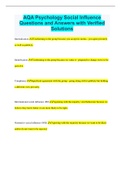
-
AQA Psychology Social Influence Questions and Answers with Verified Solutions
- Exam (elaborations) • 7 pages • 2023
- Available in package deal
-
- $9.99
- + learn more
AQA Psychology Social Influence Questions and Answers with Verified Solutions Internalisation Conforming to the group because you accept its norms - you agree privately as well as publicly. Identification Conforming to the group because we value it - prepared to change views to be part of it. Compliance Superficial agreement with the group - going along with it publicly but holding a different view privately. Informational social influence (ISI) Agreeing with the majority view/behaviour becau...
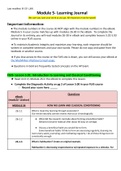
-
AP Psychology All modules 1-9 Journal Notes
- Package deal • 9 items • 2022
-
- $35.99
- + learn more
AP Psychology Journals from all modules (1-9) Module names: 1. Scientific Foundations of Psychology 2. Biological Bases of Behavior 3. Sensation and Perception 4. Cognitive Psychology 5. Learning 6. Developmental Psychology 7. Motivation, Emotion, and Personality 8. Clinical Psychology 9. Social Psychology Full notes. Finished the course w/ an A.
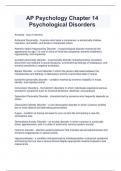
-
AP Psychology Chapter 14 Psychological Disorders
- Exam (elaborations) • 2 pages • 2024
-
- $14.49
- + learn more
Amnesia - loss of memory Antisocial Personality - A person who lacks a conscience, is emotionally shallow, impulsive, and selfish, and tends to manipulate others Attention-deficit Hyperactivity Disorder - A psychological disorder marked by the appearance by age 7 or one or more of three key symptoms: extreme inattention, hyperactivity, and impulsivity. avoidant personality disorder - A personality disorder characterized by consistent discomfort and restraint in social situations, over...
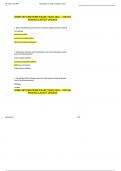
-
NRNP 6675-15; NRNP 6675 Week 6 Midterm Exam 2022/23 100% solved -Graded A+
- Exam (elaborations) • 59 pages • 2023
-
- $17.99
- + learn more
NRNP 6675-15; NRNP 6675 Week 6 Midterm Exam 2022/23 100% solved -Graded A+ NRNP 6675-15; NRNP 6675 Week 6 Midterm Exam 2022 100% solved -Graded A+ NRNP 6675-15; NRNP 6675 Week 6 Midterm Exam 2022 100% solved -Graded A+ 1. Which of the following are risk factors for neuroleptic malignant syndrome? Select all that apply Age Rapid dose escalation Parental route of administration Higher potency typical antipsychotics 2. Antipsychotic medications provide D2 blockade in the mesocortical pathway c...
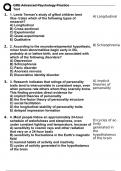
-
GRE Advanced Psychology Practice Test
- Exam (elaborations) • 36 pages • 2023
-
- $13.49
- + learn more
1. 1. Lewis Terman's study of gifted children best illus- trates which of the following types of research? A) Longitudinal B) Cross-sectional C) Experimental D) Quasi-experimental E) Qualitative 2. 2. According to the neurodevelopmental hypothesis, minor brain abnormalities begin early in life, probably at or before birth, and are associated with which of the following disorders? A) Depression B) Schizophrenia C) Panic disorder D) Anorexia nervosa E) Dissociative identity disorder 3. 3. Researc...

$6.50 for your textbook summary multiplied by 100 fellow students... Do the math: that's a lot of money! Don't be a thief of your own wallet and start uploading yours now. Discover all about earning on Stuvia


